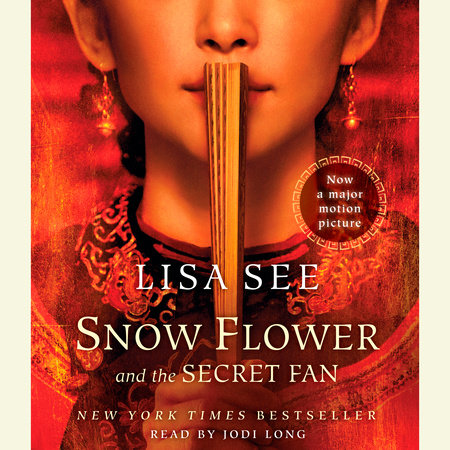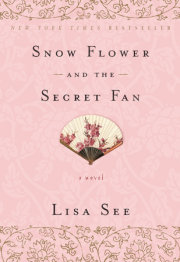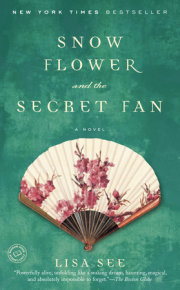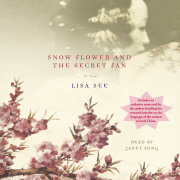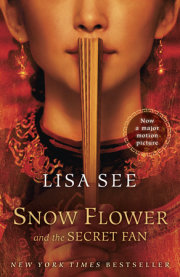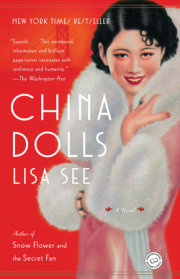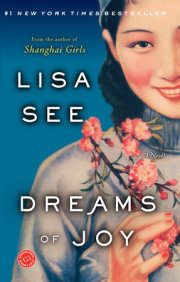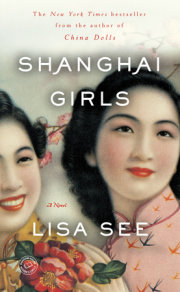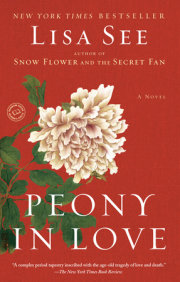Chapter 1Milk Years
My name is Lily. I came into this world on the fifth day of the six month of the third year of Emperor Daoguang’s reign. Puwei, my home village, is in Yongming County, the county of Everlasting Brightness. Most people who live here are descended from the Yao ethnic tribe. From the storytellers who visited Puwei when I was a girl, I learned that the Yao first arrived in this area twelve hundred years ago during the Tang dynasty, but most families came a century later, when they fled the Mongol armies who invaded the north. Although the people of our region have never been rich, we have rarely been so poor that women had to work in the fields.
We were members of the Yi family line, one of the original Yao clans and the most common in the district. My father and uncle leased seven mou of land from a rich landowner who lived in the far west of the province. They cultivated that land with rice, cotton, taro, and kitchen crops. My family home was typical in the sense that it had two stories and faced south. A room upstairs was designated for women’s gathering and for unmarried girls to sleep. Rooms for each family unit and a special room for our animals flanked the downstairs main room, where baskets filled with eggs or oranges and strings of drying chilies hung from the central beam to keep them safe from mice, chickens, or a roaming pig. We had a table and stools against one wall. A hearth where Mama and Aunt did the cooking occupied a corner on the opposite wall. We did not have windows in our main room, so we kept open the door to the alley outside our house for light and air in the warm months. The rest of our rooms were small, our floor was hard-packed earth, and, as I said, our animals lived with us.
I’ve never thought much about whether I was happy or if I had fun as a child. I was a so-so girl who lived with a so-so family in a so-so village. I didn’t know that there might be another way to live, and I didn’t worry about it either. But I remember the day I began to notice and think about what was around me. I had just turned five and felt as though I had crossed a big threshold. I woke up before dawn with something like a tickle in my brain. That bit of irritation made me alert to everything I saw and experienced that day.
I lay between Elder Sister and Third Sister. I glanced across the room to my cousin’s bed. Beautiful Moon, who was my age, hadn’t woken up yet, so I stayed still, waiting for my sisters to stir. I faced Elder Sister, who was four years older than I. Although we slept in the same bed, I didn’t get to know her well until I had my feet bound and joined the women’s chamber myself. I was glad I wasn’t looking in Third Sister’s direction. I always told myself that since she was a year younger she was too insignificant to think about. I don’t think my sisters adored me either, but the indifference we showed one another was just a face we put on to mask our true desires. We each wanted Mama to notice us. We each vied for Baba’s attention. We each hoped we would spend time every day with Elder Brother, since as the first son he was the most precious person in our family. I did not feel that kind of jealousy with Beautiful Moon. We were good friends and happy that our lives would be linked together until we both married out.
The four of us looked very similar. We each had black hair that was cut short, we were very thin, and we were close in height. Otherwise, our distinguishing features were few. Elder Sister had a mole above her lip. Third Sister’s hair was always tied up in little tufts, because she did not like Mama to comb it. Beautiful Moon had a pretty round face, while my legs were sturdy from running and my arms strong from carrying my baby brother.
“Girls!” Mama called up the stairs to us.
That was enough to wake up the others and get us all out of bed. Elder Sister hurriedly got dressed and went downstairs. Beautiful Moon and I were slower, because we had to dress not only ourselves but Third Sister as well. Then together we went downstairs, where Aunt swept the floor, Uncle sang a morning song, Mama—with Second Brother swaddled on her back—poured the last of the water into the teapot to heat, and Elder Sister chopped scallions for the rice porridge we call congee. My sister gave me a tranquil look that I took to mean that she had already earned the approval of my family this morning and was safe for the rest of the day. I tucked away my resentment, not understanding that what I saw as her self-satisfaction was something closer to the cheerless resignation that would settle on my sister after she married out.
“Beautiful Moon! Lily! Come here! Come here!”
My aunt greeted us this way each and every morning. We ran to her. Aunt kissed Beautiful Moon and patted my bottom affectionately. Then Uncle swooped in, swept up Beautiful Moon in his arms, and kissed her. After he set her back down, he winked at me and pinched my cheek.
You know the old saying about beautiful people marrying beautiful people and talented people marrying talented people? That morning I concluded that Uncle and Aunt were two ugly people and therefore perfectly matched. Uncle, my father’s younger brother, had bowlegs, a bald head, and a full shiny face. Aunt was plump, and her teeth were like jagged stones protruding from a karst cave. Her bound feet were not very small, maybe fourteen centimeters long, twice the size of what mine eventually became. I’d heard wicked tongues in our village say that this was the reason Aunt—who was of healthy stock, with wide hips—could not carry a son to term. I’d never heard these kinds of reproaches in our home, not even from Uncle. To me, they had an ideal marriage; he was an affectionate rat and she was a dutiful ox. Every day they provided happiness around the hearth.
My mother had yet to acknowledge that I was in the room. This is how it had been for as long as I could remember, but on that day I perceived and felt her disregard. Melancholy sank into me, whisking away the joy I had just felt with Aunt and Uncle, stunning me with its power. Then, just as quickly, the feeling disappeared, because Elder Brother, who was six years older than I was, called me to help him with his morning chores. Having been born in the year of the horse, it is in my nature to love the outdoors, but even more important I got to have Elder Brother completely to myself. I knew I was lucky and that my sisters would hold this against me, but I didn’t care. When he talked to me or smiled at me I didn’t feel invisible.
We ran outside. Elder Brother hauled water up from the well and filled buckets for us to carry. We took them back to the house and set out again to gather firewood. We made a pile, then Elder Brother loaded my arms with the smaller sticks. He scooped up the rest and we headed home. When we got there, I handed the sticks to Mama, hoping for her praise. After all, it’s not so easy for a little girl to lug a bucket of water or carry firewood. But Mama didn’t say anything.
Even now, after all these years, it is difficult for me to think about Mama and what I realized on that day. I saw so clearly that I was inconsequential to her. I was a third child, a second worthless girl, too little to waste time on until it looked like I would survive my milk years. She looked at me the way all mothers look at their daughters—as a temporary visitor who was another mouth to feed and a body to dress until I went to my husband’s home. I was five, old enough to know I didn’t deserve her attention, but suddenly I craved it. I longed for her to look at me and talk to me the way she did with Elder Brother. But even in that moment of my first truly deep desire, I was smart enough to know that Mama wouldn’t want me to interrupt her during this busy time when so often she had scolded me for talking too loudly or had swatted at the air around me because I got in her way. Instead, I vowed to be like Elder Sister and help as quietly and carefully as I could.
Grandmother tottered into the room. Her face looked like a dried plum, and her back bent so far forward that she and I saw eye to eye.
“Help your grandmother,” Mama ordered. “See if she needs anything.”
Even though I had just made a promise to myself, I hesitated. Grandmother’s gums were sour and sticky in the mornings, and no one wanted to get near her. I sidled up to her, holding my breath, but she waved me away impatiently. I moved so quickly that I bumped into my father—the eleventh and most important person in our household.
He didn’t reprimand me or say anything to anyone else. As far as I knew, he wouldn’t speak until this day was behind him. He sat down and waited to be served. I watched Mama closely as she wordlessly poured his tea. I may have been afraid that she would notice me during her morning routine, but she was even more mindful in her dealings with my father. He rarely hit my mother and he never took a concubine, but her caution with him made us all heedful.
Aunt put bowls on the table and spooned out the congee, while Mama nursed the baby. After we ate, my father and my uncle set out for the fields, and my mother, aunt, grandmother, and older sister went upstairs to the women’s chamber. I wanted to go with Mama and the other women in our family, but I wasn’t old enough. To make matters worse, I now had to share Elder Brother with my baby brother and Third Sister when we went back outside.
Copyright © 2005 by Lisa See. All rights reserved. No part of this excerpt may be reproduced or reprinted without permission in writing from the publisher.

